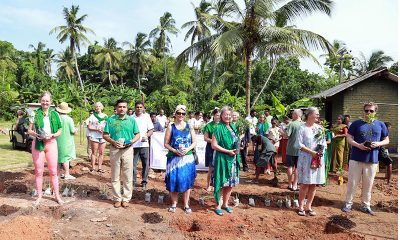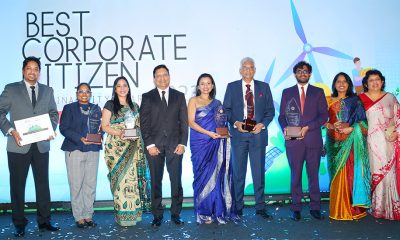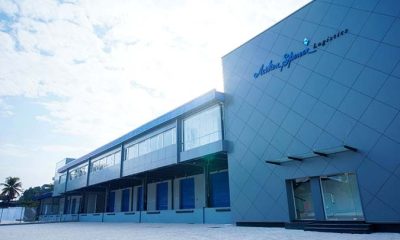Business
Aitken Spence records a strong EBITDA of Rs. 30.1 billion with a growth of 30.3% for FY23

The leading blue-chip conglomerate, Aitken Spence PLC reported an impressive EBITDA (earnings inclusive of equity accounted investees, before interest expenses, tax, depreciation, and amortization) of Rs. 30.1 billion with a growth of 30.3%, showcasing the contribution from all sectors for the year ended 2022/2023. It is noteworthy that excluding foreign exchange gains, The Group’s EBITDA recorded a growth of 77.0%.
The Group’s Profit from Operations for the year witnessed a 15.8% increase, rising from Rs. 16.4 billion to Rs. 19.0 billion. Furthermore, during the financial year that ended 31st March 2023, the Group’s Profit from Operations, excluding foreign exchange gain, recorded a substantial growth of 85.2% over the previous year.
The Group reported a profit before tax of Rs.11.2 billion which was a decline of 21.3% for the year ended 31st March 2023. This was primarily influenced by the decrease in foreign exchange gains compared to the previous year and the steep increase in interest costs due to the high interest rates that prevailed throughout the year. However, when adjusted for foreign exchange gains, profit before tax exhibited a growth of 31.9% for the year ended 31st March 2023. This adjusted measure offers a fairer assessment of performance, considering the extreme volatility of the exchange rate witnessed during the last financial year.
The Group’s strategic emphasis on geographical diversification has yielded fruitful outcomes, as evidenced by the overseas sector’s substantial contribution of over 60% to the Group’s profit before tax. During the reviewed year, the Maritime & Freight Logistics Sector emerged as the leading contributor to the Group’s profitability, accounting for 69.8%, followed by the Tourism Sector with a contribution of 20.8%, the Strategic Investments Sector with 4.8%, and the Services Sector with 4.6%. The remarkable growth of the Maritime & Freight Logistics Sector played a pivotal role in bolstering the overall performance of the Group. All five segments within this sector demonstrated their strength and resilience by making positive contributions.
Furthermore, the Group’s performance received significant boosts from segments such as apparel manufacturing and the hotels segment in the Maldives. By implementing targeted marketing strategies and making strategic adjustments, Turyaa Chennai underwent a substantial transformation in its performance, leading to the hotel achieving a profit before tax for the first time in its history.
Improved results of the Plantation segment also contributed positively towards the Group’s performance. This is despite recognising a substantial increase in deferred tax liability due to the increase in income tax rates, particularly in the plantation and hotel sectors. The excessive delays faced in the settlement of dues from the Government in the power generation segment is causing a strain on the Group’s finances with unwarranted finance cost being borne by the sector. Despite this Aitken Spence has been operating its 10MW waste-to-energy power plant based in Kerawalapitiya as halting operations would mean that the country’s Colombo District will once again be faced with a severe garbage crisis that could potentially lead to social and environmental problems.
The Group faced a significant challenge due to the fluctuation of foreign exchange rates. The profitability of the Group was adversely impacted by a considerable increase in interest expenses, which had a negative effect on capital-intensive segments like the hotels segment and the power generation segment, which heavily rely on borrowings to finance their infrastructure.
“Our foresight and insightful outlook and astute decision-making have led us to make strategic investments in foreign exchange-generating businesses. This long-term vision has proven to be remarkably advantageous during the challenging year, as these investments have played a crucial role in ensuring uninterrupted operations across all business segments within our Group. By taking a diligent approach to growth, we ensure that any expansion initiatives are well-suited to the Group and have the potential to contribute positively to the socio-economic development of our country”, commented Dr. Parakrama Dissanayake, Deputy Chairman and Managing Director of Aitken Spence PLC.
Other key highlights during the financial year 2022-2023
Acquisition of a solar power plant, adding 10MW to the renewable energy generation capacity at an investment of Rs. 1.4 billion. Presently, the Group contributes to providing for just over 1.4% of the country’s peak energy demand with renewable energy.
Invested in a joint venture for freight forwarding in Cambodia, further expanding its geographical footprint.
Commenced construction of a 100,000 sq. ft container freight station at a cost of Rs.1.6 billion. The strategically located facility will significantly expand existing capacity to handle more cargo.
‘Diversity, Equity & Inclusion (DE&I)’ under the theme ‘Freedom to be me’ was launched during the financial year. As a progressive step in this direction, parental leave was enhanced, including the duration of maternal leave been extended to 100 days and the introduction of paternal leave.
Inculcate a culture of innovation to inspire Spensonians to unleash their capacity for innovation and creativity through various initiatives such as SpenceInnova. These ideas designed and developed have been successfully implemented in various business operations.
Voluntary endorsement of the UN Global Compact marked 20 years in May 2022.
Publicly pledged to attain net zero emission status by 2030, becoming signatories to the Science Based Targets initiative (SBTi). These endeavors exemplify the Group’s steadfast commitment to addressing climate change and integrating sustainable practices into its operations.
Listed in the Colombo Stock Exchange since 1983, Aitken Spence is anchored to a heritage of excellence spanning over 150 years and driven by a team of more than 13,000 across 16 industries in 9 countries: Sri Lanka, Maldives, Fiji, India, Oman, Myanmar, Mozambique, Bangladesh and Cambodia.
Business
First Capital Holdings records Rs. 3.23Bn Total Comprehensive Income for 9M FY2025/26

First Capital Holdings PLC, a subsidiary of JXG (Janashakthi Group) and a pioneering force in Sri Lanka’s investment bank landscape recorded a Total Comprehensive Income of Rs. 3.23Bn for the nine months ended 31 December 2025, compared to Rs. 4.53Bn in the corresponding period of the previous year. For the third quarter of 2025/26, the Group reported a Total Comprehensive Loss of Rs. 0.17Bn, after accounting for a dividend tax expense of Rs. 0.41Bn.
The Group’s Net Income before Operating Expenses for the nine months of 2025/26 amounted to Rs.6.33Bn compared to Rs. 7.69Bn reported in the corresponding period of the previous year. Trading income was primarily driven by the Primary Dealer and Corporate Dealing Securities divisions, reinforcing the Group’s positioning across fixed income and equity market segments.
The Primary Dealer division reported a Profit after Tax of Rs. 1.64Bn for the nine months ended 31 December 2025 (1st nine months of 2024/25 – Profit after Tax of Rs. 2.45Bn). The results include trading gains on the government securities portfolio of Rs. 1.66Bn and net interest income of Rs. 1.41Bn (1st nine months of 2024/25 – trading gains of Rs. 3.18Bn and net interest income of Rs. 1.31Bn), reflecting movements in yields and trading conditions during the period.
The Corporate Finance Advisory and Dealing Securities division recorded a Profit after Tax of Rs. 1.86Bn for the nine months ended 31 December 2025 (1st nine months of 2024/25 – Profit after Tax of Rs. 1.94Bn). The business unit reported total trading gains of Rs. 2.33Bn on its equity portfolio, compared to Rs. 2.23Bn in the corresponding period of the previous year, supported by market participation and portfolio positioning.
The Wealth Management division reported a Profit after Tax of Rs. 78.1Mn for the nine months ended 31 December 2025 (1st nine months of 2024/25 – Profit after Tax of Rs. 90.1Mn). Assets under Management stood at Rs. 96.4Bn as at 31 December 2025, compared to Rs. 115.9Bn as at 31 March 2025, reflecting market conditions and client portfolio adjustments.
The Stock Brokering division recorded a Profit after Tax of Rs. 166.3Mn for the nine months ended 31 December 2025, compared to Rs. 39.5Mn reported in the corresponding period of the previous year, supported by increased trading activities.
Commenting on the Group’s performance, Rajendra Theagarajah, Chairman of First Capital Holdings PLC, stated, “The operating environment during the period was shaped by shifts in interest rates, capital market activities, and fiscal adjustments. Against this backdrop, the Group’s performance reflects the structural strength of its capital markets platform and its ability to generate income across multiple market cycles while maintaining financial discipline.”
Dilshan Wirasekara, Managing Director / CEO of First Capital Holdings PLC, said, “Our priority during the period was to manage each business line with a clear focus on risk, liquidity and execution. Improved performance in stock brokering and consistent contributions from corporate finance reflect our ability to respond to market conditions while aligning capital deployment with client and market opportunities.”
Business
Keells Nexus introduces an all new Loyalty App

Keells is set to usher a new chapter in customer experience with the relaunch of Keells Nexus with the introduction of its all-new loyalty app on 13th February. For 25 years, Keells Nexus has been at the heart of Sri Lankan retail, pioneering coalition loyalty and even introducing mobile-based loyalty as early as 2014. The loyalty program is building on this legacy, combining state-of-the-art technology with richer, more personalized rewards and seamless integration across the Keells ecosystem with an intuitive mobile experience.
Today, Keells Nexus stands at over 2 million registered members, a reflection of the trust customers place in Keells and the brand’s commitment to improving the quality of life for the nation. The launch further strengthens Keells’ long-standing focus on tech-enabled retail efficiency, following innovative retail experiences to customers such as self-checkout counters and retail technology that drives efficiency such as advanced inventory management systems.
The new app therefore is the next logical step in this journey, bringing together rewards, offers, and account visibility in one intuitive, streamlined interface. The new Keells Nexus app brings together all deals, savings and partner offers in one place, giving customers complete visibility and control. Members can track their points in real time, scan a QR code at checkout to earn rewards instantly, and enjoy a more personalised, more connected shopping experience.
“At the heart of Keells Nexus is a simple but powerful belief that life is better when we’re connected,” said Nilusha Fernando Head of Marketing, Keells Supermarkets & Senior Vice President, John Keells Group.
Business
IDL, Clouds by SOZO and the Rukmini Tissanayagam Trust partner with the HSBC Ceylon Literary & Arts Festival 2026

The HSBC Ceylon Literary & Arts Festival 2026, taking place from 13 to 15 February at Cinnamon Lakeside, Colombo, promises to be one of those rare cultural moments that linger long after the last session ends. It is a gathering not only of writers, artists and thinkers, but of ideas, shared, challenged and celebrated in spaces where curiosity feels welcome.
The HSBC Ceylon Literary & Arts Festival 2026 is supported by several organizations through non-promotional CSR initiatives, including Clouds by SOZO and the Rukmini Tissanayagam Trust. International Distillers Limited contributes in a strictly neutral CSR capacity, providing logistical and resource support for the event without any brand promotion or product visibility.
The Festival celebrates Sri Lanka’s creative voice by showcasing literature, arts, and cultural talent from across the country. All supporting organizations participate solely in a philanthropic and educational role, ensuring that the focus remains on artistic expression and community engagement.
The Rukmini Tissanayagam Trust brings to the Festival a deep and enduring commitment to nurturing literature and the arts as essential pillars of society. Its work is driven by the belief that creative spaces are not optional additions, but vital platforms that shape how communities think, feel and engage with the world around them.
Speaking on this collaboration, Indhu Selvaratnam, Director of SOZO Beverages and Trustee
of The Rukmini Tissanayagam Trust, stated, “The Rukmini Tissanayagam Trust is delighted to partner with the Ceylon Literary Festival for the second time. We are deeply committed to enriching Sri Lanka’s intellectual and cultural landscape and admire the festival’s evolution in embracing literature, art, music, and initiatives that nurture emerging local talent. These efforts align closely with the Trust’s mission to support creative expression, and we look forward to continuing our support as the festival strengthens Sri Lanka’s global cultural presence.”
Adding a complementary dimension to this partnership is Clouds by SOZO, Sri Lanka’s premium mountain spring water brand, whose ethos of purity, sustainability and thoughtful living aligns naturally with the spirit of the Festival. Sourced from a pristine spring in the Knuckles mountain range, Clouds represents a return to authenticity, an idea that resonates strongly within creative and cultural spaces.
Speaking on the partnership, Dushyantha De Silva, Founder of SOZO Beverages (Pvt) Ltd, said, “The arts invite us to slow down, to observe, and to think more deeply, and Clouds comes from that same place of intention. Supporting the HSBC Ceylon Literary & Arts Festival is about being part of a space where ideas flow freely and thoughtfully. It’s a privilege for us to align with a platform that values creativity, dialogue and conscious choices.”
The HSBC Ceylon Literary & Arts Festival 2026 offers something increasingly rare: three uninterrupted days of ideas. Of language and imagination. Of conversations that do not require a screen to feel alive. It is a reminder of the power of gathering, of listening, discovering and engaging with perspectives that challenge and inspire.
As February approaches, the hope is simple: that more people choose to attend, to listen, and to support Sri Lankan creativity in all its forms. Because when a country invests in its writers and artists, it is not merely celebrating talent, it is shaping how it remembers, how it questions, and how it evolves.
-

 Features5 days ago
Features5 days agoMy experience in turning around the Merchant Bank of Sri Lanka (MBSL) – Episode 3
-

 Business6 days ago
Business6 days agoZone24x7 enters 2026 with strong momentum, reinforcing its role as an enterprise AI and automation partner
-

 Business5 days ago
Business5 days agoRemotely conducted Business Forum in Paris attracts reputed French companies
-

 Business5 days ago
Business5 days agoFour runs, a thousand dreams: How a small-town school bowled its way into the record books
-

 Business5 days ago
Business5 days agoComBank and Hayleys Mobility redefine sustainable mobility with flexible leasing solutions
-

 Business2 days ago
Business2 days agoAutodoc 360 relocates to reinforce commitment to premium auto care
-

 Business6 days ago
Business6 days agoHNB recognized among Top 10 Best Employers of 2025 at the EFC National Best Employer Awards
-

 Midweek Review2 days ago
Midweek Review2 days agoA question of national pride

























